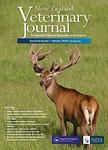版权所有:内蒙古大学图书馆 技术提供:维普资讯• 智图
内蒙古自治区呼和浩特市赛罕区大学西街235号 邮编: 010021

作者机构:Massey Univ Infect Dis Res Inst Inst Vet Anim & Biomed Sci mEpiLab Palmerston North New Zealand Univ Melbourne Fac Vet Sci Parkville Vic Australia Inst Plant & Food Res Auckland New Zealand
出 版 物:《NEW ZEALAND VETERINARY JOURNAL》 (新西兰兽医杂志)
年 卷 期:2017年第65卷第4期
页 面:209-213页
核心收录:
基 金:Massey University Doctoral Scholarship New Zealand International Doctoral Scholarship
主 题:Campylobacter spp C jejuni dog faeces prevalence multilocus sequence typing porA flaA typing
摘 要:AIMS: To investigate the prevalence of Campylobacter spp. and C. jejuni in dog faecal material collected from dog walkways in the city of Palmerston North, New Zealand, and to characterise the C. jejuni isolates by multilocus sequence typing (MLST) and porA and flaA antigen gene ***: A total of 355 fresh samples of dogs faeces were collected from bins provided for the disposal of dog faeces in 10 walkways in Palmerston North, New Zealand, between August 2008-July 2009. Presumptive Campylobacter colonies, cultured on modified charcoal cefoperazone deoxycholate plates, were screened for genus Campylobacter and C. jejuni by PCR. The C. jejuni isolates were subsequently characterised by MLST and porA and flaA typing, and C. jejuni sequence types (ST) were ***: Of the 355 samples collected, 72 (20 (95% CI=16-25)%) were positive for Campylobacter spp. and 22 (6 (95% CI=4-9)%) were positive for C. jejuni. Of the 22 C. jejuni isolates, 19 were fully typed by MLST. Ten isolates were assigned to the clonal complex ST-45 and three to ST-52. The allelic combinations of ST-45/flaA 21/porA 44 (n=3), ST-45/flaA 22/porA 53 (n=3) and ST-52/ flaA 57/porA 905 (n=3) were most ***: The successful isolation of C. jejuni from canine faecal samples collected from faecal bins provides evidence that Campylobacter spp. may survive outside the host for at least several hours despite requiring fastidious growth conditions in culture. The results show that dogs carry C. jejuni genotypes (ST-45, ST-50, ST-52 and ST-696) that have been reported in human clinical *** RELEVANCE: Although these results do not provide any evidence either for the direction of infection or for dogs being a potential risk factor for human campylobacteriosis, dog owners are advised to practice good hygiene with respect to their pets to reduce potential exposure to infection.